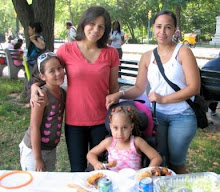The project provides simultaneous translation services at workshops for non-English speaking parents. Some workshops are now provided directly in Spanish to facilitate the learning and greater participation of Latino parents.
 In order to increase outreach, and to meet the language and cultural needs of Latino parents as well as to offer a parent support group, the project has incorporated a series of Desayunos/Encuentros. This format provides parents a way to come together, learn, and share experiences and ideas in a more intimate and informal setting. The Encuentros offer parents the opportunity for clarification and reflection on information derived from previous workshops, and facilitates a dialogue with their peers.
In order to increase outreach, and to meet the language and cultural needs of Latino parents as well as to offer a parent support group, the project has incorporated a series of Desayunos/Encuentros. This format provides parents a way to come together, learn, and share experiences and ideas in a more intimate and informal setting. The Encuentros offer parents the opportunity for clarification and reflection on information derived from previous workshops, and facilitates a dialogue with their peers.Sinergia’s Autism Project will continue to bring parents together and help to create a network of support, which incorporates educational, scientific, art and service organizations. Collaboration with these entities will help parents to learn about services and resources and foster a greater understanding of how systems work and how parents can utilize services to benefit children and sustain their families.
 Our project provides information and support for families of children with autism. Hopefully the entire network of the Autism Initiative will create greater awareness of autism and increase community understanding of the complexities and needs of children with autism and the challenges faced by their families.
Our project provides information and support for families of children with autism. Hopefully the entire network of the Autism Initiative will create greater awareness of autism and increase community understanding of the complexities and needs of children with autism and the challenges faced by their families.The “Desayunos/Encuentros for Latinos” at the moment are scheduled at the end of every quarter. After the last one held on October 2nd, it has become clear that our families need them with more frequency, at least once per month. We will be looking for funding to increase the number of Breakfasts/Dialogues, so important for parents of children with autism in our community. Ideas and/or suggestions for funding this program are welcome.
Please call our coordinator Gina Pena at 212-643-2840 for upcoming training sessions or for any further information about the Autism Initiative.
Upcoming events:
September 24, 10am to 12:30pm
“Accessing Services and Programs for Children with Autism” (simultaneous translation to Spanish provided).
October 2, 10am to 1pm
“Desayuno/Encuentro with Spanish-speaking parents.












